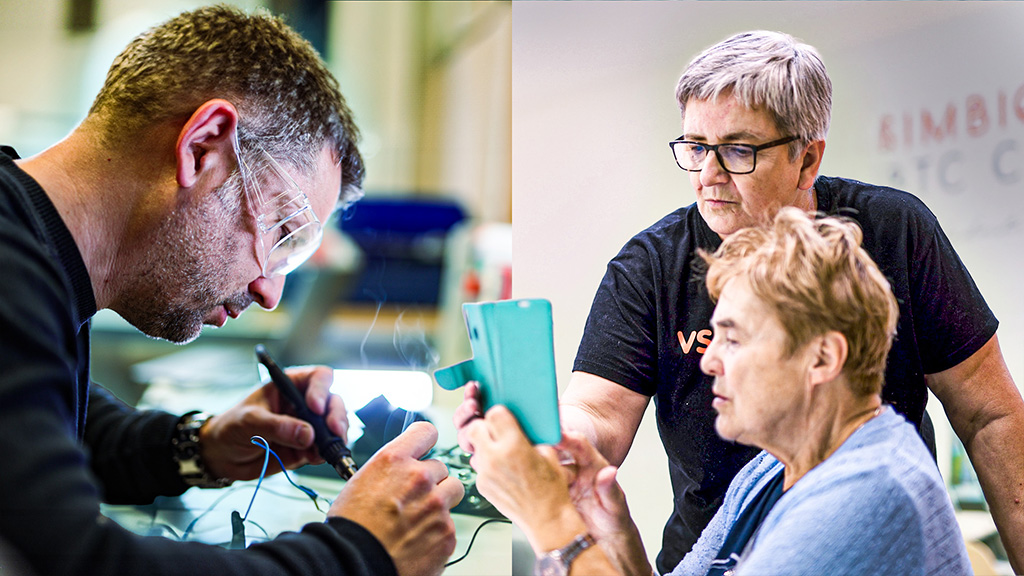
Once upon a time, I believed that all things that were broken with the world could be solved by “social.” I still do, but what we deem as social today isn’t really social. Or at least, it’s not the crux of it.
The promise of the social web isn’t that it will help us find more people who are like us to connect with. (That is merely a lovely bonus.) Nor is the promise of the social web that we can collaborate, gather feedback, grow and improve. (Another bonus.) And though I love seeing how people are able to make a living unleashing their creativity on Etsy or YouTube, this isn’t the ultimate promise either.
The promise of the social web encompasses, but isn’t limited to connecting, collaborating or creating. It’s about something much bigger, much more fundamental. And the ultimate promise of social is at risk if we focus on the tools and the outcomes.
What is the promise of the social web? If none of the above is the full realization of the power of the social web, then what is? The answer is actually incredibly simple: It’s supposed to make our lives better.
It’s supposed to make our lives simpler, less confusing, less alienating, more efficient, more meaningful and just plain better. But sometimes it does the opposite. In fact, I’d say: more often than not, it does the opposite. When it becomes an escape from reality, rather than a positive change in reality, it becomes much like other forms of escape (movies, gaming, shopping, addictions), and it only temporarily relieves us of our daily pressures.
In the early days of what was called Web 2.0, the excitement was palpable. Social tools were enabling everyday people to break through traditional barriers to connect, build their audiences and careers and get more creative than ever before. Excited theories of how democratization was going to transform the way we did business were all the rage. From Chris Anderson’s Long Tail to Jeff Howe’s Crowdsourcing, these theories were getting in front of business leaders everywhere. It was no longer merely a Groundswell (Charlene Li), the social web arrived as a bona fide business tool.
This was a cause for celebration. New, democratizing technological tools combining with the established, powerful distribution and networks of established business meant that we could go further than ever before. However, instead of business adopting groundswell thinking, most businesses sought out the tools without the new attitude, seeing them more as a new, cheaper way to get to market rather than a better way to do business altogether. Fast forward to today where social means a Facebook page with millions of likes, a Twitter account with thousands of followers and scrambling to figure out how to integrate Instagram, Pinterest and fill-in-the-blank hot social network of the day.
This is not even close to the promise that social offers. Business interests and customer interests are pinned against one another. A few beloved brands can break through the noise and get attention and a few influential social media stars can get lots of freebies, but all-in-all, the everyday customer’s life is not being improved.
The problem is that most organizations have an inherently anti-social nature. Here’s what I mean by that.
As an “influencer” myself, I have more than a few frustrating experiences that ended in companies bending over backwards to make me happy once they saw my Twitter follower numbers and Klout score. I’ve been sent flowers and gift baskets and I’ve even been called by the company CEO to discuss my needs. I’ve always responded the same way: “Thank you for taking care of my issue. Here are some suggestions to implement into your process in order to take care of this issue for all of your customers, not just the ones like me.”
And I always get the same response: “Thank you for your suggestions. We’ll propose your ideas.” I’ve never received a follow-up.
Some of these ideas have been:
- For delivery/installation services: Instead of giving an ‘all day’ window of delivery for your customers, who feel trapped not knowing what time your drivers will arrive, why have the option to get a 30 minute text message warning before the driver arrives? I already know that drivers map out their deliveries at the beginning of the day and that they have GPS on their trucks. When they are a few drops away from the customer, they could send an SMS, allowing the customer more freedom of movement through their day.
- For airlines: I understand that flight schedules get messed up due to unforeseen circumstances. It happens. However, when the last flight of the day is going out, it would make sense to check on the customers who are connecting to that flight and hold that flight a few more minutes (up to, say, 30 minutes) so they don’t get stuck in transit overnight. Yes, it’s a bit of an inconvenience to the passengers already there, but this way everyone gets home that night. Those passengers that are temporarily inconvenienced will be thankful when it’s them screaming across an airport, trying to make their botched connection.
Instead of fixing a process and improving the experience for all customers, though, these companies continue to monitor Twitter and be reactive to certain customers (read: influential). One of the issues lies in the seniority given to the social web team at various companies. They’ve been given a public voice for the company and the ability to interface directly with customers, irate or happy, but they aren’t connected to the overall strategy of the company.
One of my favorite books of all-time has been The Fifth Discipline (1990) by Peter Senge. It was written long before the social web was a thing, but fits perfectly into how the social web can fix the siloing of organizations. In the opening chapter, Senge describes a very broken beverage company whose production doesn’t talk with its promotion or its sales team. A surge in popularity in the beverage due to celebrity endorsement increases customer demand that the sales team cannot keep up with because production is unaware of the promotion and is not equipped. The company ends up losing the opportunity because the organization is so siloed.
The most frightening part of Senge’s story is that over 20 years after he wrote The Fifth Discipline, silos are still pretty common at large organizations and the scenario described happens quite often. Part of the reason for siloing departments has been to create autonomy and efficiency. But ask most employees in these organizations, and they will tell you that they have ideas to improve communication while still maintaining autonomy and efficiency. Without seniority, though, these ideas get left on bits of paper in the suggestion box.
I was once hired at a large organization in a dream role: to change the organization from within. I didn’t last long, mostly because I lost my desire to spend my energy fighting. Instead, I chose to focus that energy on building my own business. But my short experience was incredibly eye opening; I managed to get in trouble from both the legal and the public relations department within a week of my hiring because of a tweet. Within the first month, I was instrumental in the organization shutting down all chatter on the corporate Yammer, an internal, private Twitter-like service that enables organizations to bridge those silos and communicate in a lightweight way. I brought up a controversial topic (or, okay, two) that found some support across the organization, which scared the living daylights out of management, who promptly shut the communication tool down. They told us it was to prevent corporate leaks, but I knew better. I had gotten a heads-up from my boss that I should lay low on Yammer if I wanted to keep my job.
Despite this experience, I’m crazy enough to believe that becoming more social internally can fundamentally improve the way an organization functions externally. There are plenty of examples of this from Toyota to Zappos to 3M and beyond. The biggest issue is finding people who believe in it, hiring them and giving them seniority and trusting the transformation as it goes through hiccups, setbacks and growing pains.
It’s more complex than this, but fundamentally, it’s asking the following question: “What is that thing we can do to help make our customers’ lives simpler, less confusing, less alienating, more efficient, more meaningful and just plain better?”
Most successful organizations start out this way — that is why they become successful. Cable companies provide access to entertainment and information. Airlines get people from point A to point B quicker than a car or bus. Delivery companies give us the ability to send important goods as quickly and securely as possible. These companies and more create more opportunities for people and make their lives simpler, less confusing, less alienating, more efficient, more meaningful and just plain better.
But providing a service that does this isn’t enough. The access to, the process of and the interaction with that service shouldn’t be complex, confusing, alienating, inefficient and onerous to the customer. It doesn’t matter how amazing that thing is that you provide, someone else can come along and provide that thing with a better process and interaction and eat your lunch. Don’t wait until that moment to improve your approach.
And don’t make the mistake of thinking that having a dedicated Twitter rep or a popular Facebook page makes you “social.” I’m constantly surprised at the number of organizations who throw their weight behind growing numbers of Facebook likes rather than actually improving the lives of their customers. This is time and energy spent building Facebook’s empire rather than your own.
There are advantages to using platforms like Facebook and Twitter to go where your customers are, but followers and fans aren’t a solution, they should be an outcome. A large number of retailers have spent millions of dollars building stores on Facebook only to find that investment was a poor one. It’s not that people don’t shop on social networks, it’s that people see social networks as a place to connect, create and build their own brands. Your brand’s needs aren’t why they are there.
Word of mouth is still the best form of marketing. Instead of thinking of all of the ways to reach your customers, think of all of the ways to improve your relationships with customers so they reach one another. In order to illustrate an opportunity, I’ll go back to my delivery service example and apply it to the cable company. Instead of saying “We’ll send a service agent out between 9-12,” say, “We’ll send a service agent out between 9-12, but don’t worry about having to stay home for 4 hours. If you are busy, just give us a number to text message you when we are 30 minutes away.” That’s remarkable. Simple, but remarkable. People need cable, but people will tell others about your cable company if it recognizes they are busy and don’t want to be held captive for 4 hours. Or move to a more customer-friendly pay-to-consume model, as Amazon Prime or Apple TV do, to capture customers fleeing your cable company for the competition. I guarantee people will talk. That’s social media power.
These are social ideas, not social media or social marketing. These are ideas that blend the fundamental promises of the social web — improving people’s lives blending technology and human relationships — with the strategies that will usher in the next generation of social business thinking.
The time is ripe and the bar is low. What are you waiting for? It’s time you fulfilled the promise of the social web and became a social organization.
Visit link: Are You Building Facebook’s Empire, Or Your Own?
















